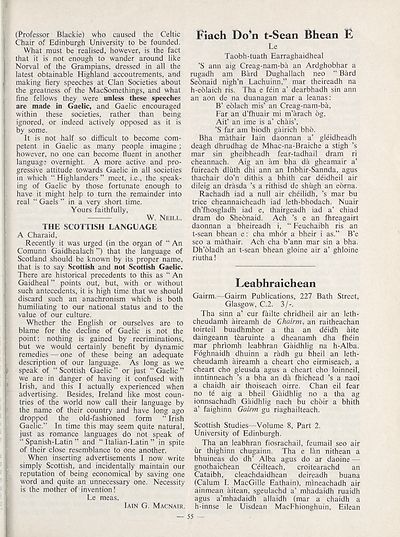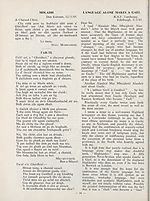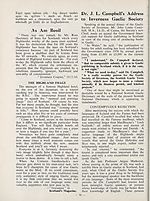An Comunn Gàidhealach Publications > Gaidheal > Volumes 58--62(part), January, 1963--March 1967
(479) Page 55
Download files
Complete book:
Individual page:
Thumbnail gallery: Grid view | List view

(Professor Blackie) who caused the Celtic
Chair of Edinburgh University to be founded.
What must be realised, however, is the fact
that it is not enough to wander around like
Norval of the Grampians, dressed in all the
latest obtainable Highland accoutrements, and
making fiery speeches at Clan Societies about
the greatness of the MacSomethings, and what
fine fellows they were unless these speeches
are made in Gaelic, and Gaelic encouraged
within these societies, rather than being
ignored, or indeed actively opposed as it is
by some.
It is not half so difficult to become com¬
petent in Gaelic as many people imagine ;
however, no one can become fluent in another
language overnight. A more active and pro¬
gressive attitude towards Gaelic in all societies
in which “ Highlanders ” meet, i.e., the speak¬
ing of Gaelic by those fortunate enough to
have it might help to turn the remainder into
real “ Gaels ” in a very short time.
Yours faithfully,
W. Neill.
THE SCOTTISH LANGUAGE
A Charaid,
Recently it was urged (in the organ of “ An
Comunn Gaidhealach ”) that the language of
Scotland should be known by its proper name,
that is to say Scottish and not Scottish Gaelic.
There are historical precedents to this as “ An
Gaidheal ” points out, but, with or without
such antecedents, it is high time that we should
discard such an anachronism which is both
humiliating to our national status and to the
value of our culture.
Whether the English or ourselves are to
blame for the decline of Gaelic is not the
point: nothing is gained by recriminations,
but we would certainly benefit by dynamic
remedies — one of these being an adequate
description of our language. As long as we
speak of “ Scottish Gaelic ” or just “ Gaelic ”
we are in danger of having it confused with
Irish, and this I actually experienced when
advertising. Besides, Ireland like most coun¬
tries of the world now call their language by
the name of their country and have long ago
dropped the old-fashioned form “ Irish
Gaelic.” In time this may seem quite natural,
just as romance languages do not speak of
“ Spanish-Latin ” and “ Italian-Latin ” in spite
of their close resemblance to one another.
When inserting advertisements I now write
simply Scottish, and incidentally maintain our
reputation of being economical by saving one
word and quite an unnecessary one. Necessity
is the mother of invention!
Le meas,
Iain G. Macnair.
Fiach Do’n t-Sean Bhean E
Le
Taobh-tuath Earraghaidheal
’S ann aig Creag-nam-ba an Ardghobhar a
rugadh am Bard Dughallach neo “ Bard
Seonaid nigh’n Lachuinn,” mar theireadh na
h-eolaich ris. Tha e fein a’ dearbhadh sin ann
an aon de na duanagan mar a leanas:
B’ eolach mis’ an Creag-nam-ba,
Far an d’fhuair mi m’arach 6g,
Ait’ an ime is a’ chais’,
’S far am biodh gairich bho.
Bha mathair Iain daonnan a’ gleidheadh
deagh dhrudhag de Mhac-na-Braiche a stigh ’s
mar sin gheibheadh fear-tadhail dram ri
cheannach. Aig an am bha da gheamair a’
fuireach dluth dhi ann an Inbhir-Sannda, agus
thachair do'n dithis a bhith car deidheil air
dileig an drasda’s a rithisd de shiigh an eorna.
Rachadh iad a null air cheilidh, ’s mar bu
trice cheannaicheadh iad leth-bhodach. Nuair
dh’fhosgladh iad e, thairgeadh iad a’ chiad
dram do Sheonaid. Ach ’s e an fhreagairt
daonnan a bheireadh i, “ Feuchaibh ris an
t-sean bhean e: cha mhor a bheir i as.” B’e
seo a mathair. Ach cha b’ann mar sin a bha.
Dh’oladh an t-sean bhean gloine air a’ ghloine
riutha!
Leabhraichean
Gairm.—Gairm Publications, 227 Bath Street,
Glasgow, C.2. 3/-.
Tha sinn a’ cur finite chridheil air an leth-
cheudamh aireamh de Chairm, an raitheachan
toirteil buadhmhor a tha an deidh aite
daingeann tearuinte a dheanamh dha fhein
mar phriomh leabhran Gaidhlig na h-Alba.
Foghnaidh dhuinn a radh gu bheil an leth-
cheudamh aireamh a cheart cho eirmiseach, a
cheart cho gleusda agus a cheart cho loinneil,
inntinneach ’s a bha an da fhichead ’s a naoi
a chaidh air thoiseach oirre. Chan eil fear
no te aig a bheil Gaidhlig no a tha ag
ionnsachadh Gaidhlig nach bu choir a bhith
a’ faighinn Gairm gu riaghailteach.
Scottish Studies—Volume 8, Part 2.
University of Edinburgh.
Tha an leabhran fiosrachail, feumail seo air
ur thighinn chugainn. Tha e lan nithean a
bhuineas do dh’ Alba agus do ar daoine —
gnothaichean Ceilteach, croitearachd an
Cataibh, cleachdaidhean deireadh buana
(Calum I. MacGille Eathain), mineachadh air
ainmean aitean, sgeulachd a’ mhadaidh ruaidh
agus a’mhadaidh allaidh (mar a chaidh a
h-innse le Uisdean MacFhionghuin, Eilean
55 —
Chair of Edinburgh University to be founded.
What must be realised, however, is the fact
that it is not enough to wander around like
Norval of the Grampians, dressed in all the
latest obtainable Highland accoutrements, and
making fiery speeches at Clan Societies about
the greatness of the MacSomethings, and what
fine fellows they were unless these speeches
are made in Gaelic, and Gaelic encouraged
within these societies, rather than being
ignored, or indeed actively opposed as it is
by some.
It is not half so difficult to become com¬
petent in Gaelic as many people imagine ;
however, no one can become fluent in another
language overnight. A more active and pro¬
gressive attitude towards Gaelic in all societies
in which “ Highlanders ” meet, i.e., the speak¬
ing of Gaelic by those fortunate enough to
have it might help to turn the remainder into
real “ Gaels ” in a very short time.
Yours faithfully,
W. Neill.
THE SCOTTISH LANGUAGE
A Charaid,
Recently it was urged (in the organ of “ An
Comunn Gaidhealach ”) that the language of
Scotland should be known by its proper name,
that is to say Scottish and not Scottish Gaelic.
There are historical precedents to this as “ An
Gaidheal ” points out, but, with or without
such antecedents, it is high time that we should
discard such an anachronism which is both
humiliating to our national status and to the
value of our culture.
Whether the English or ourselves are to
blame for the decline of Gaelic is not the
point: nothing is gained by recriminations,
but we would certainly benefit by dynamic
remedies — one of these being an adequate
description of our language. As long as we
speak of “ Scottish Gaelic ” or just “ Gaelic ”
we are in danger of having it confused with
Irish, and this I actually experienced when
advertising. Besides, Ireland like most coun¬
tries of the world now call their language by
the name of their country and have long ago
dropped the old-fashioned form “ Irish
Gaelic.” In time this may seem quite natural,
just as romance languages do not speak of
“ Spanish-Latin ” and “ Italian-Latin ” in spite
of their close resemblance to one another.
When inserting advertisements I now write
simply Scottish, and incidentally maintain our
reputation of being economical by saving one
word and quite an unnecessary one. Necessity
is the mother of invention!
Le meas,
Iain G. Macnair.
Fiach Do’n t-Sean Bhean E
Le
Taobh-tuath Earraghaidheal
’S ann aig Creag-nam-ba an Ardghobhar a
rugadh am Bard Dughallach neo “ Bard
Seonaid nigh’n Lachuinn,” mar theireadh na
h-eolaich ris. Tha e fein a’ dearbhadh sin ann
an aon de na duanagan mar a leanas:
B’ eolach mis’ an Creag-nam-ba,
Far an d’fhuair mi m’arach 6g,
Ait’ an ime is a’ chais’,
’S far am biodh gairich bho.
Bha mathair Iain daonnan a’ gleidheadh
deagh dhrudhag de Mhac-na-Braiche a stigh ’s
mar sin gheibheadh fear-tadhail dram ri
cheannach. Aig an am bha da gheamair a’
fuireach dluth dhi ann an Inbhir-Sannda, agus
thachair do'n dithis a bhith car deidheil air
dileig an drasda’s a rithisd de shiigh an eorna.
Rachadh iad a null air cheilidh, ’s mar bu
trice cheannaicheadh iad leth-bhodach. Nuair
dh’fhosgladh iad e, thairgeadh iad a’ chiad
dram do Sheonaid. Ach ’s e an fhreagairt
daonnan a bheireadh i, “ Feuchaibh ris an
t-sean bhean e: cha mhor a bheir i as.” B’e
seo a mathair. Ach cha b’ann mar sin a bha.
Dh’oladh an t-sean bhean gloine air a’ ghloine
riutha!
Leabhraichean
Gairm.—Gairm Publications, 227 Bath Street,
Glasgow, C.2. 3/-.
Tha sinn a’ cur finite chridheil air an leth-
cheudamh aireamh de Chairm, an raitheachan
toirteil buadhmhor a tha an deidh aite
daingeann tearuinte a dheanamh dha fhein
mar phriomh leabhran Gaidhlig na h-Alba.
Foghnaidh dhuinn a radh gu bheil an leth-
cheudamh aireamh a cheart cho eirmiseach, a
cheart cho gleusda agus a cheart cho loinneil,
inntinneach ’s a bha an da fhichead ’s a naoi
a chaidh air thoiseach oirre. Chan eil fear
no te aig a bheil Gaidhlig no a tha ag
ionnsachadh Gaidhlig nach bu choir a bhith
a’ faighinn Gairm gu riaghailteach.
Scottish Studies—Volume 8, Part 2.
University of Edinburgh.
Tha an leabhran fiosrachail, feumail seo air
ur thighinn chugainn. Tha e lan nithean a
bhuineas do dh’ Alba agus do ar daoine —
gnothaichean Ceilteach, croitearachd an
Cataibh, cleachdaidhean deireadh buana
(Calum I. MacGille Eathain), mineachadh air
ainmean aitean, sgeulachd a’ mhadaidh ruaidh
agus a’mhadaidh allaidh (mar a chaidh a
h-innse le Uisdean MacFhionghuin, Eilean
55 —
Set display mode to:
![]() Universal Viewer |
Universal Viewer | ![]() Mirador |
Large image | Transcription
Mirador |
Large image | Transcription
| An Comunn Gàidhealach > An Comunn Gàidhealach Publications > Gaidheal > Volumes 58--62(part), January, 1963--March 1967 > (479) Page 55 |
|---|
| Permanent URL | https://digital.nls.uk/127154529 |
|---|
| Description | This contains items published by An Comunn, which are not specifically Mòd-related. It includes journals, annual reports and corporate documents, policy statements, educational resources and published plays and literature. It is arranged alphabetically by title. |
|---|
| Description | A collection of over 400 items published by An Comunn Gàidhealach, the organisation which promotes Gaelic language and culture and organises the Royal National Mòd. Dating from 1891 up to the present day, the collection includes journals and newspapers, annual reports, educational materials, national Mòd programmes, published Mòd literature and music. |
|---|---|
| Additional NLS resources: |
|

